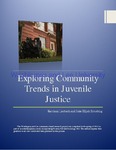| dc.rights.license | In Copyright | en_US |
| dc.creator | Laubach, Kerriann E. | |
| dc.creator | Struebing, Jake E. | |
| dc.date.accessioned | 2013-11-06T14:29:56Z | |
| dc.date.available | 2013-11-06T14:29:56Z | |
| dc.date.created | 2013 | |
| dc.identifier | WLURG38_Laubach_Struebing_POV_SOAN_2013_wm | |
| dc.identifier.uri | http://hdl.handle.net/11021/24079 | |
| dc.description | Kerriann E. Laubach is a member of the Class of 2016 of Washington and Lee University School of Law. | en_US |
| dc.description | Jake E. Struebing is a member of the Class of 2014 of Washington and Lee University. | en_US |
| dc.description | Capstone; [FULL-TEXT FREELY AVAILABLE ONLINE] | en_US |
| dc.description.abstract | This study examines the need and effectiveness of alternative rehabilitative services for juvenile delinquents in the Rockbridge County school system and juvenile justice system. We believe that juvenile delinquency has negative repercussions in educational development, economic outcomes, and social interaction, consequently incentivizing the community to restoratively intervene in the public interest and on behalf of troubled youths. In order to test this hypothesis, we assess the theoretical framework behind juvenile justice systems, delinquency, and causal etiologies in the existing social-scientific research; we review the effectiveness of rehabilitative interventions in the juvenile justice system; and we administer a series of interviews to community stakeholders in order to gauge social attitudes and behavioral associations relating to the juvenile justice system in Rockbridge County. After considering the evidence, we conclude that certain youth in Rockbridge County face socioeconomic barriers to extracurricular and summer activities that may foster responsibility and keep them out of trouble. Moreover, both parents and juveniles engaged in the criminal justice system do not have access to alternative measures of support. Ultimately, we recommend both developing and funding activities for local youth, emphasizing accessibility for at-risk youth. [From Executive Summary] | en_US |
| dc.description.statementofresponsibility | Kerriann Laubach | |
| dc.description.statementofresponsibility | Jake Elijah Struebing | |
| dc.format.extent | 50 pages | en_US |
| dc.language.iso | en_US | en_US |
| dc.rights | This material is made available for use in research, teaching, and private study, pursuant to U.S. Copyright law. The user assumes full responsibility for any use of the materials, including but not limited to, infringement of copyright and publication rights of reproduced materials. Any materials used should be fully credited with the source. | en_US |
| dc.rights.uri | http://rightsstatements.org/vocab/InC/1.0/ | en_US |
| dc.subject.other | Washington and Lee University -- Capstone in Shepherd Program for the Interdisciplinary Study of Poverty and Human Capability | en_US |
| dc.title | Exploring Community Trends in Juvenile Justice | en_US |
| dc.type | Text | en_US |
| dcterms.isPartOf | RG38 - Student Papers | |
| dc.rights.holder | Laubach, Kerriann E. | |
| dc.rights.holder | Struebing, Jake E. | |
| dc.subject.fast | Juvenile delinquency -- Prevention | en_US |
| dc.subject.fast | Academic achievement | en_US |
| dc.subject.fast | Discrimination in juvenile justice administration | en_US |
| dc.subject.fast | High school students -- Discipline | en_US |
| dc.subject.fast | Human capital | en_US |
| dc.subject.fast | Peer pressure | en_US |
| local.department | Shepherd Poverty Program | en_US |
| local.scholarshiptype | Capstone | en_US |
